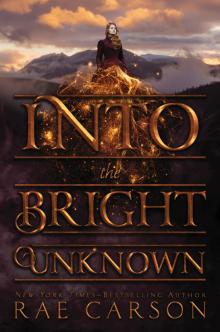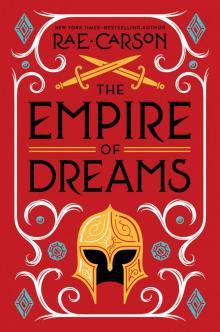- Home
- Rae Carson
The Empire of Dreams Page 21
The Empire of Dreams Read online
Page 21
“Training is over for tonight,” I say. “Let’s get back to the bunk room.”
In the morning, a slight burn permeates the muscles in my shoulders and forearms. It reminds me of training with Hector and Rosario. It’s the burn of accomplishment.
Pedrón, Itzal, and the army recruits seem to struggle, though, wincing as they pull on their boots, rising gingerly to their feet.
Aldo and I exchange an amused glance.
In the training arena, Master Santiago puts us through the forms again, this time adding Sandstorm and Sleeping Heron.
After a few sequences, he steps back, appraising us all. One side of his mustache is not as thoroughly waxed as the other; it drifts below his lip with the slight breeze.
“I did not expect to say this,” he says, frowning, “but some of you made minor improvements compared to your previous tragedy.” He walks over to Pedrón and sticks his mustache in the boy’s face. “Did you consume a magical elixir? Sell your soul to an evil trickster?”
“Er . . . no, sir?”
“And you,” Master Santiago says, moving toward Itzal. “You have suddenly learned the difference between left and right, like a serviceable three-year-old. How is this possible?”
“Got a good night’s sleep, sir.”
“I’m so glad to hear it. Since you slept so well, please step forward and lead your fellow recruits in the next set.”
Itzal opens his mouth to protest, closes it, glances at me in panic. I give him what I hope is a subtle nod of encouragement.
He forces himself to walk to the front of our formation. Itzal says, “Begin with Bulwark!” and demonstrates with his sword.
Without a reference, Itzal is once again terrible. Gradually, with some correction from Master Santiago and some snickering from the direction of the Basajuan boys, we make it through the entire sequence.
My shoulders tremble with effort by the time Santiago releases us, saying, “Even with your trifling improvements, all my hope dies when I look upon you.” He shakes his head in seeming despair and waves a hand at us. “Go. Be gone from my sorrowful eyes, for I can endure no more.”
That night, the Arturos and their fellow Basajuaños join our class.
During the next few days, we fall into a routine. Mornings begin abruptly with a clanging brass bell, followed by an uninspiring breakfast, then sword forms with Master Santiago. After lunch comes fitness training, occasionally accompanied by the second years, which consists of log lifting or sprints through the sand or—on one glorious day—drawing various sizes and types of bows. We don’t get to shoot anything, but the repetition of pulling back on the string and bending the wood is enough to make my neck and shoulders burn and puts a large blister on my finger.
After dinner, we either do an assigned chore, like cleaning the mess or unloading supplies, or we run the walls.
We’re allotted free time before lights-outs for laundry and ablutions, and that’s when we head back out to the arena and practice our forms by torchlight. We’re getting better. Master Santiago becomes less scathing in his criticism. By the end of the week, he announces that some of us are no longer an assault to his eyes, and if everyone made such marked improvement, he might consider beginning our sword training soon. That night, every single first-year recruit joins our class.
I can’t be sure whether or not the Godstone is helping, but my rib heals fast.
I’m not the strongest or fittest of the recruits, but I do myself proud, especially with running and forms. I love the burn in my muscles that attests to hard work. I love pushing my body to find out exactly what it can do. I love feeling exhausted and accomplished each night when I finally fall into my bunk.
But as each day passes, and we don’t hear from Rosario, Iván grows quieter and darker until his face displays a constant glower. He hardly speaks to me, won’t even meet my gaze as we ready for bed in Traitors’ Corner. I fear he’s right to be angry, that I made a terrible decision and this agonized waiting might get our prince killed.
Finally, one evening as we’re eating shredded chicken in a sauce of tomatoes and chilies all scooped up with corn tortillas, Sergeant DeLuca storms into the mess. He wears bright ceremonial armor and a sweeping red cloak.
The room goes silent.
“Two of you have a special assignment tonight,” he says.
Several of us exchange puzzled glances.
“The Invierno ambassador is holding a soiree for His Imperial Highness Prince Rosario and several friends. Because it’s an intimate affair attended by trusted confidants, our threat assessment is low. Still, the Royal Guard will be in attendance, as always. Since these types of events pose little risk to the imperial family, they are considered training opportunities for Guard recruits.”
Itzal leans forward on the bench. Pedrón sits up straighter than a flowering agave. Suddenly, everyone seems to beg the sergeant with their eyes, saying, “Please pick me.”
“When assigned to one of these events, you are to observe as silently and unobtrusively as possible. Be alert for any threat. Report anything suspicious to the nearest attending Guard, but do not act. You are to comport yourself with quiet decorum at all times. Do not speak unless spoken to. Do not eat or drink anything set before you. When you return to the barracks, you will say nothing of what you have heard or seen to your fellow recruits, as a test of your ability to be loyal and discreet. Am I clear?”
We respond with a pattering of “Yes, sirs.”
Sergeant DeLuca says, “Recruit Iván, Recruit Red, please stand so I can inspect your uniforms.”
We do as ordered. All eyes are on us, and the sergeant looks us over carefully, from the tops of our heads all the way down to the toes of our boots. He frowns, peering closer at me. “Recruit Red, I think you have something in your hair.”
Suddenly everyone in the room is staring at me. Of its own accord, my hand moves toward my head. Maybe food got stuck somewhere. Maybe someone put something in my hair as a joke. Maybe—
“Oh.” The sergeant recoils from me as if startled. “Never mind. It’s nothing.”
Someone behind me chuckles. I let my hand fall to my side. I keep my face neutral, my breathing calm, even as sure knowledge sets in: My magic mark is showing again. And I have no dye left for covering it up.
To everyone else, the sergeant says, “Don’t worry about being overlooked this time. Plenty of opportunities await, and everyone will get a chance.” He gestures for Iván and me to follow him.
As I’m leaving the table, I quickly lean down and say to Aldo, “Can you run the class tonight?”
“Of course. Have fun.” His words are cheery, but his gaze is not. The others stare at us with a mix of wonder and envy. Some of them are ogling my hairline.
Iván and I follow Sergeant DeLuca from the barracks. My face feels hot, and I resist the urge to finger my hair for the telltale change in texture that indicates it’s growing out a soft, magical white.
I force myself to put it from my mind. We have more important things to worry about tonight, because this is what we’ve been waiting for. Rosario must have specifically requested Iván and me.
Somehow, tonight, Rosario plans to speak with us. Maybe he’ll get us alone. Or perhaps he’ll disguise his message in casual table conversation. Iván and I will have to be careful—and alert to the prince’s cues.
The sergeant leads us through a series of corridors, past the royal apartments where I used to live, beyond the monastery, into the oldest wing of the palace. This giant, sprawling edifice is more like a small city. It was quilted together over centuries, and it shows in the way the walls change from sandstone to river rock and finally to crumbling adobe that the palace architects despair of ever keeping properly patched. Naturally, this area of deferred maintenance is where the Invierno ambassador and his staff are housed.
Tall double doors of polished mahogany mark the entrance to the ambassador’s quarters. An Invierno seneschal stands before them, tall, pale, and lithe,
with shining hair the golden brown of sun-kissed wheat fields.
“Good evening, Sergeant,” the Invierno says, in the lilt of one who was raised to speak the Lengua Classica.
Iván tenses in the space beside me. I can almost feel heat coming off his skin.
“These two recruits will be attending the prince tonight,” DeLuca says. “I’m to deliver them to the Guard in charge.”
“This way.” The Invierno opens the door and ushers us through a short hallway into a long dining room with a curved ceiling. Blue glass lanterns line the ceiling, casting the walls of the dining room in something like moonlight. A porcelain vase in an alcove overflows with blooms, filling the room with the scents of freesia and lantana.
Several attendees are already seated at the table. Conde Astón of Ciénega del Sur glares at me in challenge as we enter. There can be no doubt that Valentino’s father blames me for his son’s failure.
Beside him is Lady Jada, the mayor’s wife. As usual, her black hair is tied back too severely into a neat chignon. Jada can be frivolous and unintelligent, but Elisa has always valued her kindness and loyalty. Her smile toward me is warm, which I am happy to return.
Next to her is Lady Carilla, who waves at me while grinning brilliantly, and it takes all my discipline to resist waving merrily back. She is short and plump with a small overbite and a weak chin, not nearly as beautiful as the young women Rosario usually spends time with.
Whenever the girls at court have been kind to me, it has always been a ploy to get close to Rosario. I’ve wondered if Carilla is different, if given time and slightly different circumstances, we might have been friends.
At the head of the table is the prince himself, and he stands as we enter. He is wan, with dark circles under his eyes, but his carriage is strong, his stride confident, as he approaches.
“Thank you, Sergeant,” the prince says. “I’ll escort these recruits to Guardsman Fernando and make sure they are returned safely to the barracks later tonight.”
DeLuca opens his mouth as if to protest, but changes his mind. “Yes, Highness, of course.”
“This way.” Rosario guides us through a door at the end of the dining room and into a small kitchen. The area is warm with a busy hearth and milling with servants. My mouth waters at the scent of fresh turnip slices soaking in salted lime juice.
Rosario shoves us into a corner behind a shelf of dry storage. “Listen,” he whispers once we’re out of sight. “Fernando is not here tonight.”
“Why not?” I whisper back.
“Then who is your acting Guard?” Iván says.
“You are.”
“What?” I whisper, too loudly. “Is Fernando—”
“I’ll explain later. For now, just listen. You will stand behind me at either shoulder. Do not let anyone except Carilla approach close enough to touch me. Serving staff have been instructed to hand items to you, and you will in turn place them before me. Understood?”
My heart is ferocious in my chest. Something terrible has happened. “Of course,” I say.
“Whatever you need,” Iván says.
“I don’t expect any trouble tonight,” Rosario says. “Truly. But we’re going to take precautions anyway. Ambassador Songbird is aware of the situation. He’ll be sitting on my right, across from Carilla, as an additional buffer. After dinner, we’ll talk more. Now, let’s go.”
“Rosario, wait.” I grab his arm. “Do you have a taster tonight?”
He glares down at my hand grasping his arm, as though I’ve affronted him. Rosario’s mind-set is that of an imperial prince tonight, not a friend. I release him.
“Sorry,” I say hurriedly. “But it’s important. If you don’t have one, I should taste all your food first.”
His gaze softens. “I have a taster, thank you. But Red?” He puts his hand on my shoulder and looks me straight in the eye. “Please never, ever taste my food. I can’t risk you. You either, Iván. Now let’s go.”
I stare at Rosario’s back as we return with him to the dining room. Does he realize that by becoming Royal Guards, Iván and I will put ourselves at risk every single day?
The ambassador, named Spring Floods Spark Songbird Joy, arrived during the short time we were in the kitchen. He stands tall behind his designated chair, for Invierno custom forbids him from taking a seat until the guest of honor has done so first.
He wears a soft robe of light blue trimmed in dark gray embroidery, and his long copper-gold hair is tied back in a queue. He greets Rosario formally, but when he sees me, he frowns. “Lady Red Sparkle Stone,” he says. “I did not expect to see you here.”
“I’m just Recruit Red now, Excellency. But it’s a pleasure to see you, as always.”
Ambassador Songbird cracks a rare smile. “You talk like a true Joyan, saying what you do not mean.”
I smile back gamely. “I am a true Joyan, Your Excellency.”
“And yet these Joyans refused to accept you as their princess.” The dining room is suddenly silent, save for the muffled sound of food sizzling in the kitchen. He adds, “I was really hoping they would. It would have been best for everyone.”
“That has no bearing on whether or not I’m a true Joyan,” I say. “I’m sure you can agree that most Joyans are not princesses.”
Someone clears their throat; I’ve been talking out of place. I’m only a Guard recruit, with specific instructions to comport myself with quiet decorum.
So I take up a posture behind Rosario’s right shoulder—head up, hands behind my back, heels together—which I hope will put an end to anyone addressing me.
“And Lord Iván,” the ambassador says. “Excuse me, Recruit Iván. I’m equally surprised to see you.”
Unlike me, Iván is wise and does not answer, simply stares straight ahead from his post behind the prince’s left shoulder.
Though everyone is acquainted, the ambassador formally introduces each attendee and then recites a blessing from the Scriptura Sancta. Servants sweep in with the first course—a tomato bisque soup with lobster and scallions. Just as Rosario instructed, a steaming bowl is handed to me first, and even though I know he has a taster in the kitchen, I give the soup a good long sniff for the scent of sweet dream before setting it before him.
“I hear Altapalma had a marvelous tomato harvest this year,” Lady Jada observes, spooning up her soup.
“That countship suffered terribly after the Year Without a Summer,” Conde Astón observes. “It’s good to see the land recovering finally.”
Rosario’s shoulders tense because he knows where this will eventually go; Astón never wastes an opportunity to criticize Elisa.
“The Year Without a Summer was just as devastating to Invierno crops,” Ambassador Songbird points out.
“I heard that many Inviernos blame our empress for all that mess,” Lady Jada says. “Can you imagine? Women get blamed for everything, I suppose. Even the weather!”
“Well, actually,” Conde Astón says, “there’s been some discussion among scholars at the university that our empress was indeed to blame, that she changed the weather patterns that year with her overuse of magic. It altered the delicate spiritual balance of the world.”
I barely refrain from rolling my eyes.
“Can magic really change the weather?” Carilla asks in her soft, unassuming voice.
“How should I know?” Conde Astón says. “It’s magic.” He waves his spoon in the air, making a vaguely magical gesture.
“It’s physics,” Rosario says darkly. “And it was definitely caused by my stepmother. But things would have been worse if she had not acted the way she did.”
Astón gives the prince an indulgent smile. “I know you’ve been told that. It’s certainly a politically prudent viewpoint.”
“It’s the truth.”
“The prince is correct,” says Ambassador Songbird. “Though I would clarify and say it was both magic and physics.”
“How do you mean?” Lady Jada asks.
“The empress destroyed several mountains that year using magic, yes? This is historical record.”
Others around the table nod.
“This destruction was in many ways irresponsible; it threw enough ash and dust into the air to lower temperatures everywhere during the next growing season.” Rosario is about to protest, but the ambassador holds up a hand to dissuade him and adds, “But her actions saved the Invierno capital from the Eyes of God, massive twin volcanoes on the brink of major eruption. Had they been allowed to erupt, the effect would have been tenfold, plunging us into an age of ice.”
I remember that year well, the first summer after I came to Brisadulce. It snowed in the desert, making swooping white hills of the sand dunes. It was all anyone talked about.
Astón raises one eyebrow. “So you say.”
“So say all the experts at our own universities,” Songbird clarifies.
Astón chuckles, giving no doubt as to what he thinks about Invierno “experts.”
My heart beats too fast for the mere act of standing behind my prince, and my face is warm. If I were fully Invierno, my cheeks would be bright red by now. This is what it’s like to be a Royal Guard. Hearing and seeing everything, doing and saying nothing. No matter how strongly you feel about an issue or event. Even if you were there to witness it.
“I imagine an age of ice would have had far-reaching consequences,” Carilla says. “So many plants and animals could not have survived. They might have gone extinct, just like the great luminescing birds of ancient Invierne.”
“Lady Carilla is correct,” Rosario says. “It would have been catastrophic. My stepmother saved the world that year.”
“Let’s not get carried away!” Astón says. “It’s fashionable to exaggerate the accomplishments of our monarchs, but that usually happens long after their deaths, as their reigns fade to myth and legend.”
Rosario raises his chin and says, “As the only Joyan bearer of a Godstone, Elisa is a living legend, the kind who only comes along once every century.”
“It’s heartwarming to know you have such love and loyalty for her,” Astón says.

 The Crown of Embers
The Crown of Embers The Girl of Fire and Thorns
The Girl of Fire and Thorns Walk on Earth a Stranger
Walk on Earth a Stranger Into the Bright Unknown
Into the Bright Unknown The Bitter Kingdom
The Bitter Kingdom The Rise of Skywalker
The Rise of Skywalker Like a River Glorious
Like a River Glorious The King's Guard
The King's Guard The Empire of Dreams
The Empire of Dreams Most Wanted
Most Wanted The Crown of Embers fat-2
The Crown of Embers fat-2 The King's Guard (fire and thorns)
The King's Guard (fire and thorns) The Girl of Fire and Thorns fat-1
The Girl of Fire and Thorns fat-1 Fire and Thorns 00.7: King's Guard
Fire and Thorns 00.7: King's Guard The Shadow Cats (fire and thorns )
The Shadow Cats (fire and thorns ) The Shattered Mountain (fire and thorns)
The Shattered Mountain (fire and thorns)